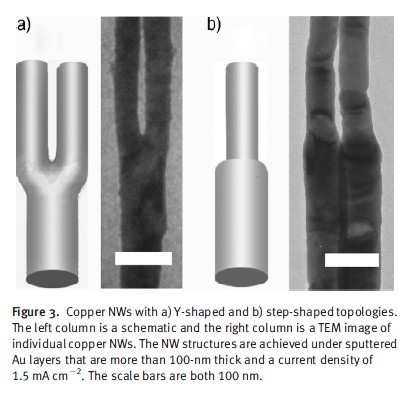|
Carbon nanotubes (NTs) and nanowires (NWs) with various topologies have received considerable interest for their novel electrical switching and rectifying behavior, with potential applications in switches, rectifiers, diodes, and integrated circuits. Scientists from from The Institute of Solid State Physics (ISSP), Chinese Academy of Sciences (CAS), made important progress in studying the thermal expansion behavior of nanotubes and nanowires. The result was published on Small 6, 381-385 (2010) recently。
Dr. YANG Dachi and graduate student ZHU Chuhong from MENG Guowen’s group, synthesized copper nanotubes and nanowires with Y- and step-shaped topologies. The specific topologies were fabricated by first sputtering an Au layer on the stem and large-diameter-segment surface side of Y- and step-AAO templates, and subsequent electro-deposition.
In situ X-ray diffraction (XRD) investigation demonstrates that the thermal expansion of copper carbon nanotubes and nanowires with Y- and step-shaped topologies is temperature dependent. The thermal-expansion coefficients of the stem (for Y-shaped topologies) and large-diameter segments (for step-shaped topologies) are more sensitive than those of the branch and small-diameter segments, respectively. This observation is very important for designing nanodevices and nanosystems (with building blocks of NTs and NWs with Y- and step-shaped topologies) working in a wide temperature range.
This work was supported by National Natural Science Foundation of China (NSFC, No.50525207, 50972145), “Nanotechnology” Major Scientific Research Programs (No.2007CB936601) and CAS 100 Talents Program.
 |